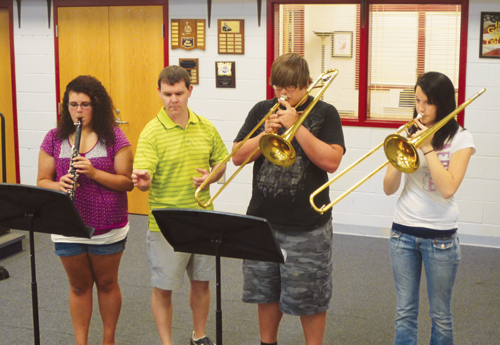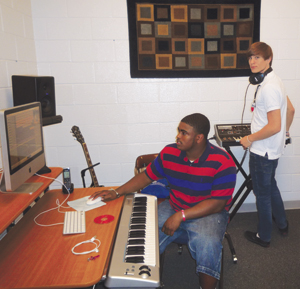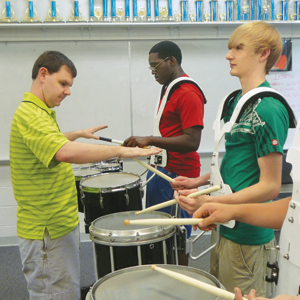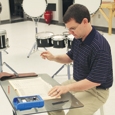
Despite having little initial experience in the field, Chris Harper developed an extensive technology program at Screven County High School in Georgia that attracts both band students and those who have never considered playing an instrument. The program inspires students to pursue a variety of creative composing and recording projects. Harper earned degrees from Valdosta State University and Troy University.
What was the genesis for your technology classes?
In the summer of 2007, I started work on a master’s degree at Troy University in Alabama, and one of the first courses I took was Ray Smith’s advanced music technology class. Before I walked in I could not tell you what a microphone or a mixer did. He told the class that a band director who does not use a simple mixer, a portable speaker, and a microphone to address the audience at a concert deserves to have the audience to walk out. We started talking about microphones, sound reinforcement and how to mic drums and saxes for a jazz band. I had never thought about these issues before and started to understand how sound gets hidden in a jazz band performance.
Smith took us to the music tech section of a music store in Montgomery, Alabama, and encouraged us to play around with everything and ask questions. As I asked questions about the differences in various analog and digital synthesizers, I realized that my students back home could benefit from the addition of technology in the music program. After the summer ended I went to my principal to ask about starting a music technology class. I knew there were students walking around the school who could play guitar and drums but never would have considered playing in the band program. I felt strongly that these students would enjoy learning about technology and computers.
Two years ago we decided to eliminate the chorus at our school and the left us with a vacant space next to the band room. I have always been a big fan of electronic music, everything from Karlheinz Stockhausen to Trent Reznor. I asked the principal and received approval to begin a music tech program. At the first class we started with just a microphone, a Macbook, and some old PCs I rescued. Much of our early work was done in Finale Notepad and GarageBand. Now, I look around and am amazed that our technology program has spread across two rooms with a slew of computers, MIDI controllers, audio monitors, synthesizers, and more.
What is the curriculum for technology classes?
The technology curriculum has quickly grown into two classes. Students in the level one class start out with lessons on the basic rules of music notation. Although many of the students in class play an instrument, I have been surprised by the progress of those with no musical training. They have the computer savvy already and pick up the necessary musical skills through immersion. After learning the basics about scoring, harmony, dissonance, and consonance, we move on to more advanced compositions. Some of the most talented students take off quickly in the composing unit and write a 60-measure quintet.
After two to three weeks of reading and writing music we will segue into a big unit on setting up microphones and the uses of different types of microphones. I test student skills at setting up microphones for an imaginary band performance in the auditorium that night. The sound check is in 20 minutes, and in this hypothetical situation, the drumset is set up, but all microphones need to be placed and sound reinforcement, the mixer, and monitors need to be ready to go. The exercise is for a grade, and I am always surprised at the teamwork that the students show.
We cover MIDI controllers and Garage Band on the Macs. I introduce students to loops, sequencing, editing, drum loops, and other concepts. With this basic knowledge have had great success with writing soundtracks to short videos. One of the more enjoyable projects this year was shooting a video while driving in the car or walking through the auditorium, for which groups of students had three weeks to compose music to go with the images. Students broke into groups and developed accompaniments with a mix of as many as 30 different tracks, and when they came back with the finished product, one was funny, one was dramatic, and one was like a horror movie.
How do you fund the music technology program?
One of our best fundraisers has been to develop a compilation CD with all of the various pieces that students have created. I will master about fifteen tracks on it and offer people a free CD in exchange for a donation. The first time we offered the CD at a concert, we ended up with 52 donations that helped us buy some new microphones. I’m very blessed that despite any financial hardships today, the school district has never cut my budget. For a rural school district, that is sensational.
 What was the biggest surprise as you have developed the music technology program?
What was the biggest surprise as you have developed the music technology program?
The chance to use technology has really engaged some students who initially seemed quiet. I have found that some of these students are not shy, just right brained. Students who have barely spoken all year have found their voices through the computer and microphones. I have students who perform poorly in many other classes but have a solid A in my class. I asked one student why he was doing so much better in the tech class and he replied, “I can think in here.” These classes are always a hive of activity with students moving from station to station. Everybody is doing something different. It is neat to see that creativity unleashed.
How do you channel that creativity?
I have a few of the level two music tech students perform the first piece on every concert. Typically this group will include a guitarist, vocals, and a vibraphone or some auxiliary percussion; I think this is a much better way to open a concert. At a typical band concert, students are honking away on stage before the conductor comes out, turns his back to the audience, and starts; it seems extremely formal and detached. I start concerts by thanking everyone for coming, then introducing the music tech students. We might follow this with the percussion ensemble, and then go to full band. Everybody enjoys the variety, and going from small ensembles to bigger ones builds the program nicely.
What obstacles have you faced in developing your band program?
Local employers here range from agriculture to an automobile bearing plant, and we struggle sometimes with scheduling. Many people have been laid off, and students have been forced to assume new responsibilities to help support their families. I am blessed to have good attendance, but there will be times when a student has to leave rehearsal to make it to work. That type of financial hardship is something we have never faced before.
The other obstacle is trying to keep students fired up about music. When I was young, I could not wait to get home and practice my instrument or ride my bike outside. In the current generation there are students who like band but would rather sit at home texting. That type of apathy and indecisiveness is something I fight against. I tell students it is ok to work at McDonald’s to support you family as long as you work hard and get promoted to shift manager in a year.
What techniques do you use to keep students fired up?
One of the best ways has been trips to see professional orchestras. A number of years ago I developed a great relationship with the manager of the Charleston Symphony Orchestra. I told her that I wanted to bring students to hear the orchestra but could not afford the $55 seats. She arranged for us to have balcony seats for $15 a ticket. With dinner and a few dollars to pay for a charter bus, the trip ends up costing about $25 per student.
One year the orchestra was scheduled to play Pictures at an Exhibition, and I programmed a good transcription for our upcoming concert. We started rehearsing the piece before the trip to Charleston. It was such a great teaching tool for students to see professionals at the top of their careers playing the same piece. After the trip, we continued to rehearse for two weeks before our concert. I am absolutely convinced that our performance was better because of our exposure to the professionals.
I also took six students on a memorable trip to hear the Atlanta Symphony. We drove over three hours to hear a piece that did not have anything to do with our current concert music. I just knew that some of the students would enjoy the concert. They heard Ravel’s Bolero, and on the ride home, I heard them singing that ostinato the entire way. When students get that fired up about music, I feel tremendous fulfillment.
How did you develop your programming approach?
I came up through an excellent high school program at Heritage High School in Conyers, Georgia. We played the most serious pieces you could imagine, including the grade 6 Canticle of the Creatures and Lord of the Rings. When I made it to college at Valdosta State, I met other students who had come from various high school programs, some quite strong, others that were not that good. They told me about the music they had played in school, and I didn’t know many of the pieces. I knew the most advanced works but fewer good works for grades 3 and 4.
One day a friend of mine invited me to attend a concert at Cook High School about 40 minutes north of Valdosta. At first I did not want to attend, but that concert had a dramatic impact on me because I met director Deborah Bradley, who became an important mentor. She knew I was a college student and offered to teach me everything she knew. Her only request was that I maintain an open mind. I started traveling out to her high school to help with rehearsals. She opened my eyes to the value of good grade 3 and 4 music. I discovered that you don’t have to play the hardest pieces simply to say you have played them. In every band program there are students who enjoy playing but treat it as a hobby. These players are not likely to go home and practice four hours a day, but playing in an ensemble can still have great value to these students.
Her views on how to structure a concert have proven quite influential to me over the years. She noted that every concert should include a patriotic tune, because there will probably always be a veteran in the audience and everybody loves a piece that will bring tears to their eyes. She told me to program a transcription on every concert. She said “Trust me, you will learn that not every piece in the band world is good.” She emphasized the value of playing a piece that is one grade level above the skills of the band to keep everybody from getting bored with the music after one reading.
I started helping out with her concerts and digging into her library, making frequent discoveries of hidden gems long out of print. One surprising find was a variety of great transcriptions by John Cacavas. I found a grade 4 transcription of Shostakovich 5 that is pretty scarce these days. Deborah Bradley also reminded me of the important of listening to every piece on the CDs that arrive from publishers, not just the first 20 seconds. I started calling publishers and asking them to send me the same promotional CDs that they send to directors. Even now that I have been teaching for more than ten years I still call up other directors for great pieces that will wow audiences. I started making lists of pieces years ago that I think audiences and students will like.
What was your most surprising programming choice?
One time I programmed John Cage’s 4’33". I brought out a senior who was a piano player and trombonist. She came out, sat down at the piano, adjusted her chair, and just sat there silently. People in the audience called out “Come on, you can do it.” One guy stomped out of the auditorium, saying “I’m not sitting through this.” At the end of the performance I came out and explained that the audience actually was the performance; everybody started clapping wildly. I like to keep our concerts lively and unpredictable.
The parents are not afraid to tell me what they think about the concerts. There is one parent of a sophomore clarinetist who has come to the concerts for several years. Unlike most parents, she will sit there and write comments almost like a contest judge. After we performed the 1812 Overture with simulated cannons (detuned bass drums placed throughout the auditorium) she wrote: “The 1812 Overture was really neat. I listened to this and the recording I have begins with a string soli. I like how yours is transcribed for the brass choir. I noted that you took some tenuto and a lot of time. The music didn’t feel rushed.” I asked what recording she owned, and she said it was a Fritz Reiner recording with the Chicago Symphony Orchestra. She commented that “he sounded like he was trying to get through the piece quickly so he could blow the cannons up.” This type of audience dedication inspires me to give the best, most exciting concerts possible. I never forget that we are educating an entire community with our concerts. It is more than just teaching students how to play.
Does your concert band rehearse daily?
Yes, we have a seven-period day and our concert band has 59 students including percussion. Due to scheduling problems we have 42 students in band during 5th period and 8 in a 7th period class. The percussionists meet during a separate period, and I have two periods daily of music technology class.
 How does it work to have band split into two periods?
How does it work to have band split into two periods?
The smaller class operates more like a chamber group with a bari sax, a baritone, two clarinets, and three trumpets. It is almost as if I have a daily private lesson with these students. I play my trumpet frequently in class and give students a model to strive for in their playing. With the smaller group, they know that it is impossible for them to hide and wait until class is over. I will be trying to stretch them mentally at every moment. Because this small class gets along so well, I find that I can’t wait for 7th period each day. The class is fairly laid back, and I don’t have to be a demanding Fritz Reiner-type while on the podium.
I used to schedule more afterschool rehearsals before concerts but have gradually become more relaxed about this over the years. I hold myself to four full-band rehearsals with everybody and maybe some large sectionals with the woodwinds or low brass and reeds. The days of scheduling 18 extra rehearsals are over. When you have too many rehearsals their importance becomes diluted. You want students to show dedication to music, but these are some who need time for a variety of activities.
How did you develop skills in brass instrument repair?
When I was in college, I was told that music majors do not have time for a part-time job. One summer I saw a flyer from a music store asking for someone to handle brass instrument returns. The ad called for someone who did not mind getting dirty. Even though I had no experience, I went over to apply for the job. I was so eager that I was given the job based on attitude alone. He directed me to the instrument repair shop that was located about a mile away from the main store.
I spent the summer in a hot, dirty shop cleaning trumpets. The cleaning fluid has now been outlawed by the EPA as a carcinogen, and I had a mask and apron to protect me. I learned that summer how to take apart trumpets, remove small dents, and prepare the instruments for future rentals. I learned so much that summer that I received an offer to work for another nearby repair shop.
I also learned a great deal from Victor Zajec’s five-day instrument course at VanderCook. He told me that I could divide up the five days any way I wanted, and I suggested two days on woodwinds and three for brass. I had not brought any instruments from Georgia to repair but volunteered to fix any broken instruments at VanderCook. He handed me a crushed detachable baritone bell and said that if I could complete the repair, I could continue repairing instruments as a side job. I spent many hours on it and the next day showed him the completed bell. He was floored. He spent the next two days teaching me about mandrel tools, After working mostly with acid at two music stores, I wanted to know how to solder, repair dents, and put instruments back together. I still get emotional thinking about how much I learned from Victor Zajec.
When I returned to school I had about $6,000 in instrument repairs. I convinced my principal that I wanted to invest in repair tools. I converted an old band booster room into an in-school repair shop. I was able to reduce the repair budget from $6,000 to $1,000. No has ever questioned why I have torches and instrument parts all over the floor. If a student drops a flute and headjoint is bent, I have a mandrel for that. I no longer send out trumpets and trombones for repair. When students need an $85 chemical clean on a trumpet, I can take care of it.
My love is actually working on trombone slides. People who work on slides will cuss those up and down, but I view a slide that will not move as a challenge. By the time I have thrown it and rolled it on the slide mandrel and taken out all of the dents, the slide is like glass. I am a perfectionist with my band program and that approach carries over to my repair work.
How have your built support for your program over the years?
When I first started at the school the program had been run for nine years by a wonderful director, who was replaced by another director who only stayed for one year. After that, students and parents were fired up for a new start for the program. I tried to program the most exciting first concert possible. The performance went so well that the superintendent came up and shook my hand after we were done playing.
We are located in a small school district with just an elementary school, a middle school, and a high school that now has about 745 students. I find that it is so much of an advantage not to compete with another high school in town. The local newspaper has been a big supporter of our efforts and after the first concert the headline read “The Band is Back.” I was thrilled by the coverage but started to worry about topping myself. We do not fill the house for our concerts, but at our small school we regularly draw 200 or 300 people who enjoy our concerts and spread the word in the community.
* * *
Screven Co. H.S. Equipment List
Main Studio:
21" Apple iMac
M-Audio Keystation 61es (61-key MIDI controller)
Prosonus Firestudio Project (Firewire recording system)
Logic Studio (a professional level recording, mixing, and mastering program used in many studios)
Native Instruments Komplete (a collection of instrument sounds and effects)
M-Audio CX8 Monitors (high-resolution active studio reference monitors)
KRK RoKit 5 Monitors (having two sets of monitors makes it easy to compare recordings)
Shure SRH440 Headphones
Moog Little Phatty Synthesizer
Roland SH201 Synthesizer
Dave Smith Mopho (monophonic synthesizer box)
Thousands of loops (loops are included with Logic Studio, can be downloaded for free from the internet or created by students, and are included on sample CDs that occasionally come with music tech magazines)
16-channel snake
A couple dozen XLR (standard microphone) and TRS (similar to a headphone jack) cables
Student Workstations
21" Apple iMac
Apogee ONE (USB microphone interface)
M-Audio Oxygen 25 controller (a small MIDI controller/25-key keyboard)
Yamaha headphones
Logic Express (a recording, mixing, and mastering program similar to Garage Band, closer to Logic Pro)
Finale Notepad
Portable Studio:
15" MacBook Pro
Apogee Duet (Firewire audio interface for recording)
Logic Express
Microphones:
Shure: PG58, KSM-32, SM57, Beta 52A, Beta 57, SM58
Audio Technica: AT2020, AT2021
Sennheiser: 604, 609
After a decade at Screven County, Harper begins a new position this fall as director of bands at Berrien High School in Nashville, Georgia.
Photos for this article were taken by Shelly Trimm and Enoch Autry.





